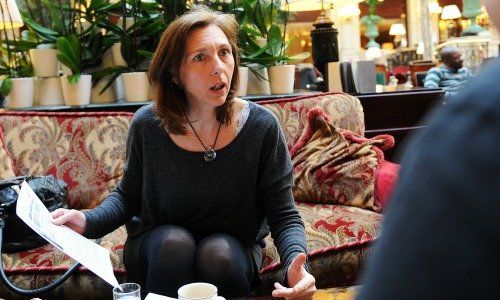UBS' legal battle with France is coming to a head, but the Swiss bank remains defiant. A high-profile legal case involving a former bank employee-turned-whistleblower shows why.
Stephanie Gibaud, «the women who really knew too much» as she has described herself, appears in court today to defend herself against a suit brought by UBS in France.
The Swiss bank accuses Gibaud, who worked in marketing and events for UBS from 1999 until five years ago, of defamation. She penned a book about the bank's alleged tax offenses in 2014, which fed France's investigation into UBS.
«Vigorously Defends»
The legal wrangling between UBS and France is expected to accentuate in coming months: the bank suffered a setback recently when a legal gamble in Strasbourg was rejected. The bank had sought to overturn what it sees as an arbitrarily set bail of 1.3 Swiss francs.
The bank faces a massive fine, purported by various media outlets to run in the billions. UBS is defiant in the face of the threat, which is one of two major scandals remaining for the bank to clean up. A spokesman told finews.com the bank will «vigorously defend» its position in court.
Whistleblower Gibaud in particular feels the heat of UBS' defense. The bank vehemently resists «claims that are without foundation,» UBS told French newswire «AFP» – in order to protect its good name.
Punchy Ermotti
The defiance underscores that France is a question of honor for UBS.
Bank boss Sergio Ermotti didn't mince words when asked about the probe last Friday during a press conference on last year's results: money is secondary in setting aside the probe, he said. UBS is primarily concerned with safeguarding its reputation, according to the CEO.
«We can only do a settlement when we believe the facts that lead to a settlement are accurate enough to entertain a resolution of the matter and in order to protect our reputation,» Ermotti said.
He was referring to a new legal procedure in France for corruption, tax fraud or money-laundering cases.
No Way, No How
Like an American non-prosecution agreement, the so-called «convention judiciaire d'intérêt public», or CJIP, allows firms to reach regulatory settlements without the risk of a court trial or admitting any wrong-doing.
Ermotti signaled that UBS has no intention of entertaining taking the CJIP way out, which would let the bank put the matter aside quickly and presumably quickly. He said «there is still work to be done» before UBS will agree with French prosecutors on the facts of the case.
Timid Stance Against U.S.
His defiance to French authorities and willingness to risk a direct court confrontation is a stark contrast to UBS' more timid stance against U.S. authorities, where it has been prosecuted and fined for a range of crimes including helping wealthy Americans cheat on their taxes, rigging benchmark interest rates and manipulating gold and silver prices.
In a landmark 2009 deal, UBS was the first Swiss bank to admit wrong-doing to settle an offshore probe, though it didn't go far as hometown rival Credit Suisse, which pled guilty to criminal charges in the same probe.




































